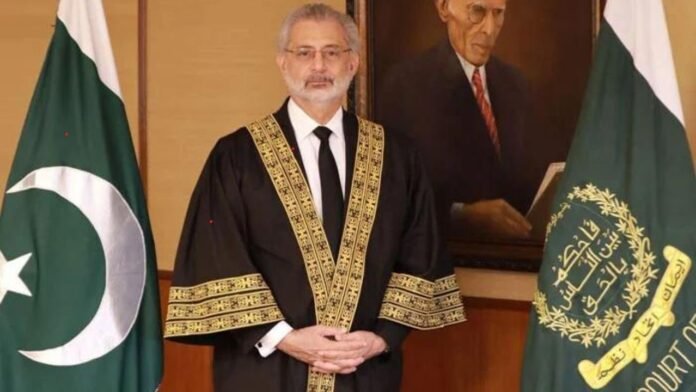Asif 2 done
During a Supreme Court hearing on the Sunni Ittehad Council’s allocation of specific seats, Chief Justice Qazi Faez Isa emphasized the need for Pakistan to adhere to its constitution strictly and said that the Supreme Court’s decisions are based on merit. The hearing was held by a 13-member full bench that included prominent justices Syed Mansoor Ali Shah, Muneeb Akhtar, and Ayesha Malik; Attorney General Mansoor Usman Awan presented the arguments.
The attorney general started by responding to previous inquiries from the court regarding the allocation of specific seats during the 2018 elections, stating that records exist for these seats in both the 2002 and 2018 elections. He further explained that according to the constitution, political parties are given specific seats, not individuals running independently. They can only do so if they have secured at least one general seat. He also mentioned ten reserved non-Muslim seats, among other things.
He went ahead to explain how this formula applied to specific seats. In the 2018 election, there were 272 contested seats, with three postponed. Thirteen independent candidates succeeded, nine of whom joined political parties. The formula applied to the remaining 265 seats, with 60 reserved for women and 10 for non-Muslims. This differed from 2002 when Article 51 guided seat allocation.
Justice Athar Minallah observed an exciting matter that goes against an Election Commission decision to exclude a political party from contesting an election. He thought such a decision was a grave violation of constitutional provisions. Should the judiciary correct such unconstitutional actions? The Attorney General responded, saying that he would tackle this point later, concentrating on whether independent candidates could fall under Article 51 and even eligibility criteria put in place for Sunni Ittehad Council’s people about specific seats.
Justice Ayesha Malik observed that the number of independent candidates in 2024 was very high, raising questions about whether the constitution doesn’t allow for any seat to be vacant. Justice Mansoor Ali said no case involving independent members had come up like this one. The Attorney General explained that no elections will be necessary if less than 120 days remain before the assembly’s term ends.
Justice Muneeb Akhtar asked where all these independent candidates came from and what role the Election Commission had played. He argued that the parliamentary system is an essential foundation of political parties. Mistakes made by the Election Commission brought about the present situation within four months of the assembly’s term ending. The Election Commission has to put everything in place under the Election Act.
Whether an independent candidate may become a political party member or form a parliamentary group. CJ Qazi Faez Isa and other justices discussed how to allocate specific seats as the main discussion points. Justice Muneeb Akhtar insisted on it, saying that political parties are the fundamental basis for the existence of the parliamentary system. The court should rectify mistakes made by the Election Commission.
The attorney general read some sections of the constitution and discussed allocations for specific seats provided in 2018. He contended that even after merging with other factions, these independents could not create a parliamentary party. When none of them had won any seat for their respective groups once they merged with them. However, other judges disagreed, arguing that parliament should recognize such a party only if they had won seats. The law courts identified parties without requiring those conditions.
Justice Mansoor Ali Shah questioned the Election Commission’s authority to declare the Sunni Ittehad Council a parliamentary party. At the same time, Justice Jamal Mandokhail emphasized that Article 51 speaks of seats and not membership. Chief Justice Isa reiterated that the court’s decisions are based on justice and that Pakistan should follow the constitution.
The Attorney General concluded his arguments, and the lawyer for the Sunni Ittehad Council stated. He would finish his rebuttal during the next session. The court adjourned the hearing until July 9th.
Throughout the hearing, the recurrent theme was upholding the Constitution and ensuring that the EC’s actions were constitutional. Chief Justice Isa argued on this basis, highlighting justice as a precursor for constitutional adherence in solving this matter. The deliberations also showed. How complex electoral law could be and what it takes for Pakistani parliamentarians to remain within their constitutional limits.


